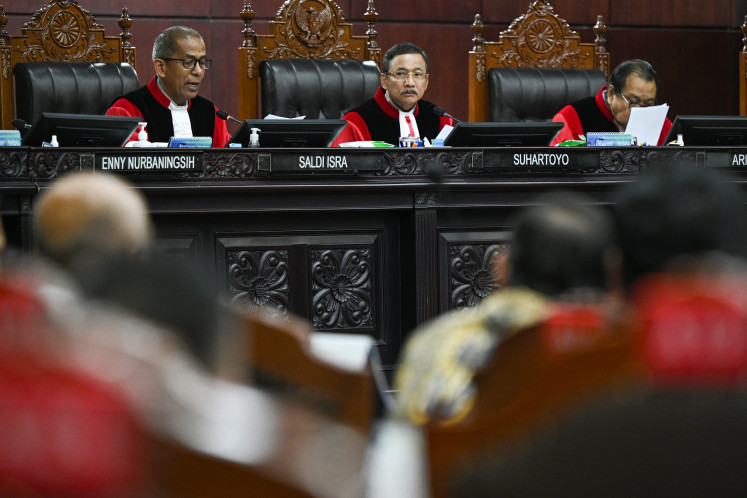Popular Reads
Top Results
Can't find what you're looking for?
View all search resultsPopular Reads
Top Results
Can't find what you're looking for?
View all search resultsGovernment puts fintech in Annual Meetings’ spotlight
The government is taking the effects of the digital economy seriously as it plans a major discussion on financial technology (fintech) as the flagship seminar of the 2018 International Monetary Fund-World Bank Group Annual Meetings, which will take place from Oct
Change text size
Gift Premium Articles
to Anyone
T
he government is taking the effects of the digital economy seriously as it plans a major discussion on financial technology (fintech) as the flagship seminar of the 2018 International Monetary Fund-World Bank Group Annual Meetings, which will take place from Oct. 8 to 14 in Nusa Dua, Bali.
Titled “Bali Fintech Agenda”, the seminar is set to take place on Thursday and will be opened with a keynote speech from President Joko “Jokowi” Widodo.
Secretary at the Office of the Coordinating Economic Minister Susiwijono Moegiarso said the event would also present other top-notch speakers on the global fintech agenda, including IMF managing director Christine Lagarde.
“This is the only flagship seminar that the Indonesian government has initiated [at the Annual Meetings],” Susiwijono said recently during a press briefing on the event’s preparation. “We are going to have top fintech players as panelists, Christine Lagarde, leaders of the [WB’s] Development Committee and the IMF Committee.”
Susiwijono, who also heads the Annual Meetings’ national committee, said the seminar would be categorized as a high-level government meeting. It is expected to result in 12 principles that will serve as a reference for global fintech development.
Prior to the seminar, the government consulted several institutions related to fintech, including the Financial Services Authority (OJK) and Bank Indonesia (BI).
“Additionally, we have consulted with the Trade Ministry, Industry Ministry and Creative Economic Agency for fintech-based trade financing and we will take the findings to the seminar,” said Susiwijono.
According to a study by the Institute for the Development of Economics and Finance (Indef) published in August, since the OJK established its first fintech regulation in 2016, the industry contributed Rp 26 trillion (US$1.7 billion) to the Indonesian economy.
The financial services sector gained the biggest benefit from fintech’s expansion, which is estimated to be at Rp 7.4 trillion, followed by the trade sector, excluding car and motorcycle sales, at Rp 7.2 trillion.
Furthermore, fintech’s robust expansion helped to reach out to consumers and thus developed household consumption by Rp 8.94 trillion, the Indef study said.
“Sectoral wise, fintech will stimulate growth mostly in the financial services sector, insurance, corporate services, pension funds and information and communications,” Indef said on the study.
The development of the fintech industry, it said, could help small and medium enterprises (SMEs) find funding, as stated in the 2017 World Bank financial inclusion index, which stated SMEs’ financing gap had reached $165 billion, or 19 percent of Indonesia’s GDP.
The OJK reported fintech platforms had channeled Rp 7.64 trillion in loans in the first half, a whopping 173 percent increase year-to-date from the entirety of last year when the number stood at Rp 2.56 trillion.
Meanwhile, as of August, the fintech industry had absorbed more than 215,000 workers, resulting in Rp 4.56 trillion paid out in salaries, said the study.
BI payment system policy executive director Onny Widjanarko said on a separate occasion that the peer-to-peer lending system, which is part of fintech technology, would help credit growth reach 16 percent by 2023.
The government has targeted for 10 to 12 percent credit growth this year. “With the existing conditions, we can only boost credit growth to 13.5 percent by 2023,” said Onny. “Therefore, we can increase non-conventional credit channeling to cover the other 2.5 percent.”
Sixteen percent credit growth would boost Indonesia’s financing industry by 6 percent, Onny added.










